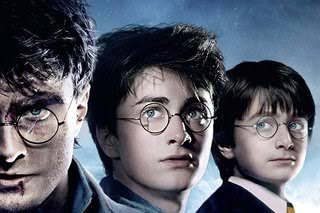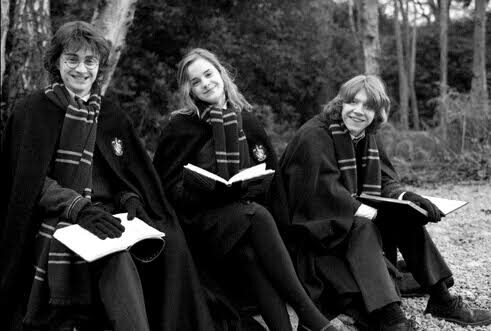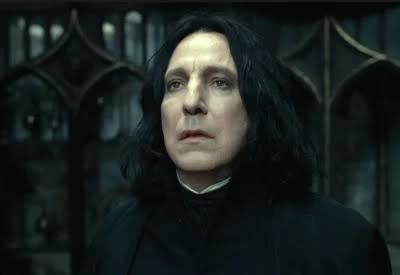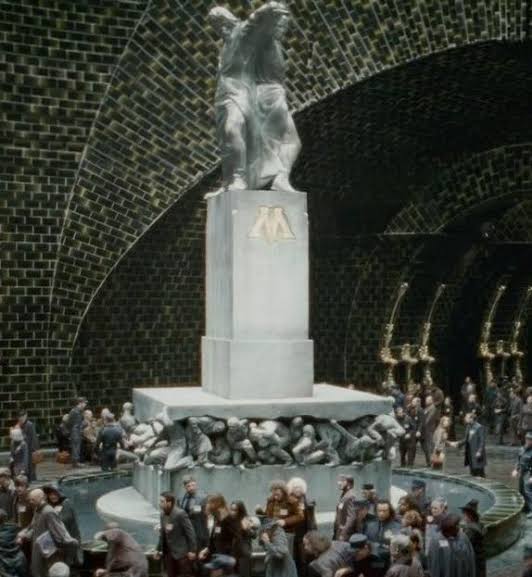Whenever we mention Harry Potter, we have this image of children bewildered by magic and the magical world of Britain which then gradually changes to a rather gritty atmosphere portraying the darker side of humanity wrapped in the guise of curses and dark arts causing a great deal of suffering to the rebellious teens. So far, the two age groups mentioned here are children and adolescents. As such, both these age groups will find many of the themes depicted in this epic series #relatable.
 |
| As portrayed here, an innocent child(right) growing up to being a gritty teen hero(left): A theme overused maybe? |
But what about adults? Can adults feel anything reading/watching the Harry Potter epic series? Should they dismiss this as a relic of their teen years/childhood? Do they have any influence over the lives, opinions, thoughts, and mentality of adults? If such questions were put to adults regarding any franchise, it's only natural a diversity of opinions will flood the comment section which may even lead to potential 'comment war'. I can't speak for all adults but I will speak for myself here(I mean this is my blog after all).
I've seen and read movies and books respectively in my teens. In those days, my grasp of English was a little lacking. The franchise used British English accent which made understanding the movies a bit difficult for me( I am sure there are many in South Asia who'd agree British English is harder to munch down than American English). The books authored by JK Rowling, a British writer, sometimes felt hard to penetrate and mine the nuances and meanings of the dialogues and situations presented. As a result, I was bereft of the subtle yet amazing wonders of the vast and intricate world of Harry Potter. However, I was still an avid fan. I was mesmerized by the flashy magic, wizardry, magical( part of European folklore) beasts, memorable characters( McGonagle, Dumbledore, Snape, Hagrid, the trio: Harry, Ron, and Hermoine, and countless others) bringing their own magic of personality into the magical universe.
When I was in the final year of my undergraduate studies, I decided to read the books again and after reading each book watch the associated movie. I believe I was elated when reading through the pages of the first book (The Philosopher's Stone). I felt as if I began reading a totally new series. There was so much information to process hidden between the lines.
 |
| Harry, Hermoine, and Ron each bringing their own color into the cauldron called friendship |
The ever-evolving relationships among Harry, Ron, and Hermoine along with the secondary characters (Luna, Neville, Malfoy, etc) taught me the value of social interactions( friendship, love, jealousy, envy, and enmity) and their effects on the individual and those around them. The youthful characters' relation and interaction with the grown-ups( Weasleys, Dursleys, Malfoys, the professors, etc) display a work of subtlety mirroring the hierarchy and class structure extant in the wider society.
 |
| Ah! Professor Snape, with one line you made us all weep in grief |
Though each character comes with their own set of complexities of character and backstory, the most pronounced of them is, I believe and you guessed it, Snape. Playing the double agent, harboring bittersweet opinion and feeling towards those around them, and the overall disposition of Snape constructs a complicated aura that entices us, the reader, to untangle and peek what resides inside this dark clothed man with a hard yet sad countenance.
 |
| The perfect master-devotee duo? |
The enemies also aren't just some one-dimensional characters like many are shown in various R-rated films, but have diverse motifs with their own stories to share with the readers. The Malfoys want racial superiority but are hesitant when their own offspring is concerned, Bellatrix is a kinslayer psychopath but worships/loves the Dark Lord, and the Dark Lord himself, with an intriguing and depressing childhood, yearns for racial dominance to cover up his own assumed lackings or 'racial impurity'. Dolores Umbridge who masks cruelty with the charade of discipline, loyalty to the government, and excessively using soft pink color and cat imagery to decorate her quarters that falsely gives off an impression of a mannered and mild woman.
To understand this diverse array of characters with intricate intentions, one cannot simply read narrations but look closely between the lines of dialogues in the book. As such, my younger self was somewhat unable to catch the realization of the great extent of the characterization presented in the books.
 |
| Magic is Might... A seemingly innocuous sentence hiding deep hatred |
So much talk about the characters. Harry Potter is so much more offering an insight into racism/xenophobia, its development and effects on society masterfully portrayed under the wrapping of a fantasy world. The later books also deal with issues of corruption, its exploitation by the elite few, media manipulation, and how our multitude of characters are entangled in the web of such themes.
Now, you may imagine a series of books, that stretches from joyful interactions of youth to grim realities of society, will be deemed too cluttered. I wholeheartedly disagree. JK Rowling, despite her current controversies to pander to certain groups, has done a splendid job in knitting a tapestry that covers the above mentioned interconnected themes.
After all the discussion I've written down in this blog, it's safe to say Harry Potter is much a series for kids as for adults. After reading all the books in quick succession in my fourth year, I've realized adults who enjoyed the books as a child or teen should again re-read the series for a better understanding. Given the entertainment industry churns out a great many violence and sex-fueled mediocre literature, movies, and drama, re-reading this epic series is totally worth your while.
Comments
Post a Comment